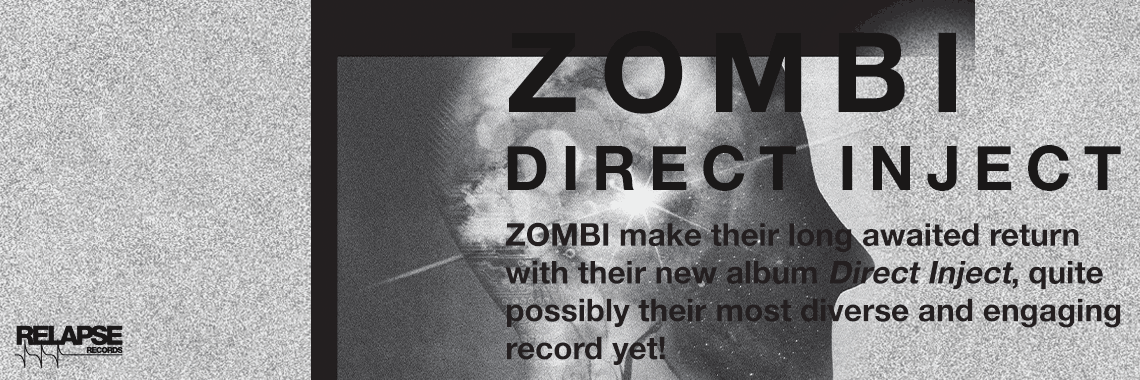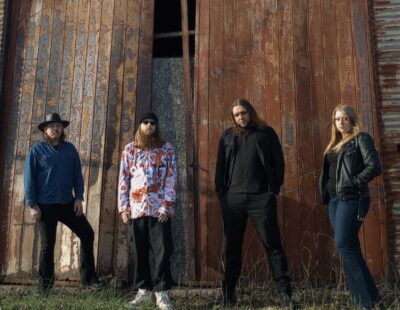A few months ago we had the pleasure of hosting the online premiere of Craven Idol’s awesome debut LP, Towards Eschaton. And it really was a pleasure, ‘cos this slab of apocalyptica is a total 100 per cent doozy. Released through Dark Descent in October, Towards Eschaton is a record that marks the Londoners’ evolution from prodigious black-thrashers to genre-shredding heavyweights, and is fast becoming the go-to record for those long nights spent spitballing solutions to the Riddle of the Steel. Around that time we caught up with guitarist/vocalist S. Vrath to get the band’s story so far. You should of course do the sensible thing and find the choice cuts from this conversation in Decibel #110, but here is the interview in redux format.
When and how did you start the band?
“It started with me and Scourger, the other guitarist, at university. We went to some metal event, I don’t quite remember what it was but we just started talking and quite soon noticed that we had quite a lot in common when it comes to influences—the first wave of extreme metal, like before things started to become pigeonholed, especially the Teutonic thrash movement with Sodom and Poison, the German Poison. It was these type of bands—Possessed, also, and heavy metal like Manilla Road and Candlemass. Initially, I must admit that we just wanted to pay tribute to these old thrash bands and the Australian black-thrash movement, like Gospel of the Hordes, Destroyer 666, et cetera. We just jammed in the Commonwealth Halls [University of London], which had a drum kit and an amp. He played drums. I was on guitars. We just kept on jamming and pretty soon we had a three-track demo together, which we self-released on tape. We released 50 copies. It was only with the EP Ethereal Altars in 2010 that we put a full line-up together with our bassist, Suspiral, and J.C. Volgard, the drummer who I had been working in my other band, Scythian. Since 2010 we’ve been a live band. Our first gig was at the Armageddon Festival in 2010 and the reception was amazing. The crowd were chanting the band’s name before the band was on the stage and it was our first show—our EP wasn’t even out.”
When did you feel like your sound was going to change, that it was going to be something more than paying tribute?
“We are really big fans of heavy metal, and the more we wrote songs the less we could identify with this kind of pigeonholing. Something I don’t get a massive kick out of is those worship bands who just take a school of thought from one band and just try to replicate that. We don’t want to be that kind of band. It is almost damaging to us to be called a black thrash band at this point. It’s almost a dirty word these days, like everyone plays black-thrash, and I don’t think that the way that we write is just thinking about a thrash metal riff and putting some black metal elements to it. The melody? We don’t shy away from that, because that is something that is very prominent in heavy metal. Yeah, it’s pretty melodic. But if it fits the context of the song then we are not going to second-guess it because of any potential third party criticism, because that’s just not how we write music. When I listen to the album, at least from my perspective, I can hear a lot of different styles and ideas.”
Even within black metal, there was always melody in there, albeit disguised with the production and performance.
“Especially with the Second Wave; the melodies are such an important part of the music. Y’know, I would just like to call it extreme metal. There is lots of that Finno black metal melody [in Craven Idol]. The death metal aspect just comes from Possessed or even Slayer, who could be considered to be death metal in that era’s context. And Massacre, absolutely. It’s just like what I was saying about the lack of tags—everything molds together beautifully when you stop thinking about these things in the context of a tag. It is just all the music we love put into work. Me and Scourger just write music that we like ourselves; other people listen to it and that’s great, and I am really glad people like it, but how much can you think about that when you write music? I don’t do that at all.”
Maybe “Orgies” is the one track that stands out on Towards Eschaton as a more obvious product of your influences. It sounds, almost like a cover. How did that one come about?
“That is actually a rerecording from a demo track, so that’s probably our most black-thrash tune. I can see completely what you mean. Because it is a track rerecorded from our first demo, that is when you can really see we really focused on trying to sound like those Australian bands, a bit more punky even.”
How do you see your sound developing?
“I think, writing-wise, it has sort of been in the same vein as the opening track, “To Summon Maryion”, which to my mind is the most varied track with the melodies and the riffing. But we are very comfortable about where we are with Towards Eschaton. I think we have found something that, hopefully, doesn’t sound like absolutely everything else.”
How do you get into the mindset to write?
“Creativity, inspiration—it comes in waves, and you just get into a mindset where you can just write a song on the spot. Because Scourger lives in Witham, out in Essex, we usually write riffs for ourselves and then share them we meet up. There has always been this chemistry between us. When we are in a room together the songs just flow. It’s just that electric feeling you have when you are in the same room and the riffs just explode out of you. We have those sessions and that’s when we usually create song structures, then we perfect them on our own again, and then bring the drummer in and it all comes together. I think we just have a similar mindset. I wouldn’t say that anything goes, but with Craven Idol it is crystal clear in our minds what goes and what doesn’t. To get motivated you just listen to your old Mercyful Fate, or your old Candlemass and Manilla Road albums. For me, it is impossible to sit down and write a riff without any sort of background thought. I really need the lyrics to wave me on, or just the ethic of the band. I am in a few bands, and I would like to think that none of them sound the same because none of it has been created in the same mindset or based on the same ideas.”
What was the big epiphany for you in discovering metal?
“I come from quite a musical family, and my parents where always playing AC/DC and Black Sabbath. It is not an uncommon story. When I first discovered the Black Metal album from Venom it was just like, ‘Woah, there is a next step to this.’ And that seven-inch by the British NWOBHM band Satan, Kiss of Death. It was just realising this new dimension to it that changed me to the metal ethic for life, and then going from there.”
AC/DC to Venom is not such a big leap. It feels like the same language, rock ‘n’ roll still but a little darker.
“And it feels somehow achievable; you would hear this music, and more than just listening to it you want to start playing. After hearing Venom, I picked up a guitar and started playing. I had only been playing some acoustic before that but after I thought I must have an electric guitar, I must start a band. But also moving to London [had a big impact]. I lived in the south of France before that, where there is basically no metal. No one listened to metal. I only discovered all these records through the hard rock background of my parents—then I move to London and there are gigs, there are all these people here! I always felt very privileged and lucky that the north London scene for this kind of music is quite strong. We have bands like Grave Miasma . . . We are all really good friends with them. There is almost a scene but we don’t call it that because we are all just friends who just happen to play here. I don’t know how many gigs we have played with Grave Miasma now but it seems to me that we are always on the same bill.”






